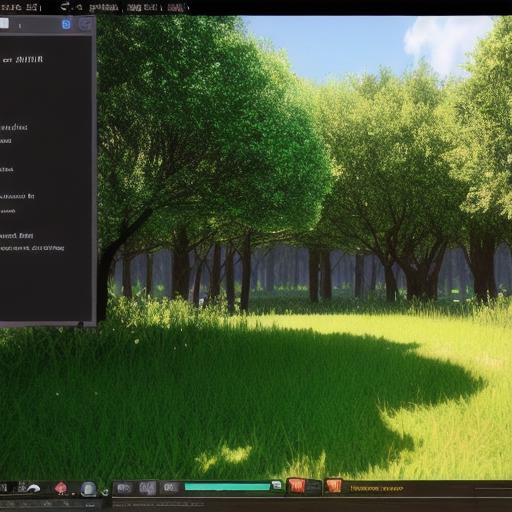As technology advances, game developers are constantly looking for new and innovative ways to create immersive gaming experiences that engage players and keep them coming back for more. One of the most exciting developments in this field is the use of artificial intelligence (AI) to enhance gameplay and create more realistic interactions between characters and environments.
In this article, we will explore some of the best AI game development tools available for creating immersive gaming experiences. We will also discuss how these tools can be used to enhance the overall quality and engagement of a game, as well as some of the potential challenges and limitations associated with using AI in games.
What are AI Game Development Tools?
AI game development tools are software programs that allow developers to create, design, and implement artificial intelligence systems into their games. These systems can range from simple behavioral scripts to complex decision-making algorithms that enable non-player characters (NPCs) to act in a more realistic and dynamic way.
The goal of these tools is to make it easier for game developers to incorporate AI into their games, allowing them to create more engaging and immersive experiences for players. Some of the key features of AI game development tools include:
- Behavioral scripts: These are simple AI systems that allow NPCs to perform specific actions based on certain conditions or triggers. For example, an NPC might move towards a player when they approach, or attack them if they get too close.
- Decision-making algorithms: These are more advanced AI systems that enable NPCs to make choices based on their environment and the behavior of other entities in the game world. For example, an NPC might choose to hide if it senses danger, or follow a player if they approach.
- Machine learning: These are AI systems that can learn and adapt over time, allowing them to become more effective at performing specific tasks or making decisions based on new information.
- Natural language processing (NLP): These are AI systems that allow NPCs to understand and respond to player input in a more natural and intuitive way. For example, an NPC might be able to recognize and respond to voice commands, or understand written text in the game world.
The Best AI Game Development Tools for Immersive Gaming Experiences
Now that we have a better understanding of what AI game development tools are, let’s take a look at some of the best options available for creating immersive gaming experiences.
- Unity ML-Agents
Unity ML-Agents is an AI game development tool that allows developers to create intelligent agents for their games using machine learning algorithms. This tool can be used to train NPCs to perform specific tasks, such as following a player or avoiding obstacles in the environment.
One of the key features of Unity ML-Agents is its ability to learn from player behavior and adapt over time. This allows NPCs to become more effective at performing their tasks and create a more engaging gameplay experience for players.
- Google TensorFlow for Games
Google TensorFlow for Games is an AI game development tool that enables developers to create intelligent agents for their games using neural networks and deep learning algorithms. This tool can be used to train NPCs to perform complex tasks, such as recognizing objects in the environment or making decisions based on their surroundings.
One of the key benefits of TensorFlow for Games is its ability to handle large amounts of data and perform real-time processing. This makes it well-suited for creating immersive gaming experiences that require quick decision-making and fast reaction times.
- Braina AI
Braina AI is an AI game development tool that allows developers to create intelligent agents for their games using a combination of rule-based programming and machine learning algorithms. This tool can be used to train NPCs to perform specific tasks, such as following a player or avoiding obstacles in the environment.
One of the key features of Braina AI is its ability to work with existing game engines and development tools, making it easy for developers to incorporate AI into their games without having to learn new programming languages or platforms.
- Playground AI
Playground AI is an AI game development tool that allows developers to create intelligent agents for their games using a visual programming interface. This tool can be used to train NPCs to perform complex tasks, such as recognizing objects in the environment or making decisions based on their surroundings.
One of the key benefits of Playground AI is its ability to make AI development more accessible and user-friendly. This tool allows developers to create intelligent agents without having to write any code or use complex algorithms, making it a great option for beginners or small game development teams.
- NVIDIA PhysX
NVIDIA PhysX is an AI game development tool that allows developers to create realistic and immersive environments for their games using physics-based simulation technology. This tool can be used to simulate the behavior of objects in the game world, such as how they interact with each other and how they respond to player input.
One of the key benefits of PhysX is its ability to handle complex physics simulations in real-time, allowing developers to create more realistic and engaging gameplay experiences. This tool is particularly well-suited for creating action games or adventure games that require players to interact with a highly detailed and interactive environment.
The Advantages of Using AI Game Development Tools
Now that we have looked at some of the best AI game development tools available, let’s discuss some of the key advantages of using these tools to create immersive gaming experiences.

- Enhanced Realism: AI game development tools can be used to create highly realistic and immersive environments for games, by simulating the behavior of objects in the game world and allowing NPCs to act in a more dynamic and lifelike way.
- Increased Engagement: By creating more engaging and interactive gameplay experiences, AI game development tools can help keep players coming back for more and increase the overall level of engagement with a game.
- Improved Performance: AI game development tools can be used to optimize the performance of games by reducing load times and improving frame rates, especially in complex environments with many objects and NPCs.
- Greater Adaptability: AI game development tools allow NPCs to learn and adapt over time, creating a more dynamic and responsive gameplay experience for players.
- Cost-Effective: Many AI game development tools are open source or available for free, which can make it easier and more cost-effective for small game development teams to incorporate AI into their games.
The Challenges of Using AI Game Development Tools
While AI game development tools offer many advantages, there are also some challenges associated with using them. Here are a few of the most common challenges:
- Complexity: AI game development tools can be complex and difficult to use, requiring developers to have specialized knowledge and skills in machine learning and artificial intelligence.
- Performance Issues: AI game development tools can require significant processing power and memory, which can lead to performance issues if not properly optimized.
- Lack of Realism: While AI game development tools can create highly realistic environments, there is always a risk that these environments may not accurately simulate the real world or the behavior of human characters.
- Ethical Concerns: The use of AI in games raises ethical concerns, particularly around the potential for bias and discrimination in decision-making algorithms.
- Limited Availability: Some AI game development tools may be proprietary or only available through certain platforms or development studios, which can limit their availability to smaller teams or independent developers.
Summary

AI game development tools offer many advantages for creating immersive and engaging gaming experiences. However, they also present some challenges that must be carefully considered before incorporating them into a game. By choosing the right tools and approaches, developers can create highly realistic and dynamic gameplay experiences that keep players coming back for more.



